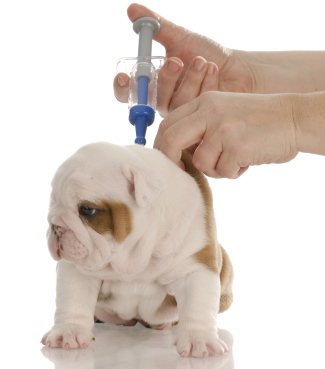| By Appointment: | |
| Mon–Fri | 8am–5:30pm |
| Walk-in and Appointments for Established Clients: | |
| Sat | 8:00am–11:30am |
| Sun | Closed |
Wednesday:
Closed 1st & 3rd Weds of each month 12–1:30pm
| Mon–Fri | 7am–6pm |
| Walk-in and Appointments for Established Clients: | |
| Sat | 8am-12pm |
| Sun | Closed |
Wednesday:
Closed 1st & 3rd Weds of each month 12–1:30pm
Parvovirus (also known as Parvo) is a serious, highly contagious viral infection of dogs that causes vomiting and bloody diarrhea. Parvovirus is transmitted through contact with the stool of an infected dog or contaminated environment. Puppies are most susceptible to parvo infection and fatalities are extremely common.
Very often, young puppies die suddenly from heart failure. This sudden death occurs before any gastrointestinal symptoms of parvovirus appear. More often, however, dogs develop a pronounced fever, become extremely depressed, and vomit. Bloody diarrhea is the most common symptom of parvovirus infection. Dogs become dehydrated, anemic (as a result of blood loss), and die quickly. Other gastrointestinal diseases may mimic parvovirus, however most are not as severe.

Vaccination against parvovirus is the best protection. Like Distemper, Parvovirus vaccination should begin at 6-8 weeks of age. Repeat vaccinations should be administered every 2-4 weeks until the puppy is 16 weeks old. Recent information regarding Parvovirus infection may extend this recommendation to 20 weeks and even longer for certain breeds. Regular booster vaccinations are strongly recommended to ensure proper immunity.
Having your dog vaccinated by a veterinarian insures protection against parvovirus infection. Only your veterinarian knows the most efficient vaccination strategy for prevention of parvovirus infection.
[ Search Articles ] [ Article Index ] [ Previous Page ]